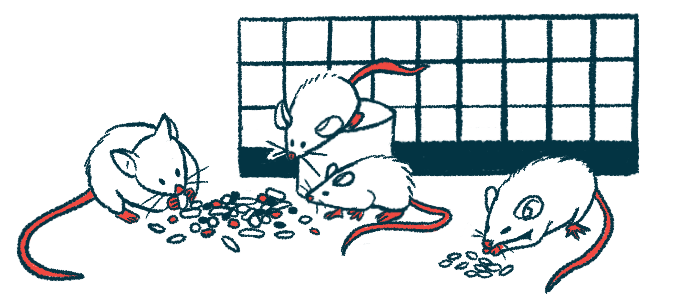AMP945 as Effective as Ofev in IPF Mouse Model; Phase 2 Trial Planned

The experimental oral therapy AMP945, from Amplia Therapeutics, is as effective as the approved therapy Ofev (nintedanib) at reducing tissue scarring, or fibrosis, in a mouse model of idiopathic pulmonary fibrosis (IPF), the company said.
In addition, findings from an already completed Phase 1 trial in healthy volunteers showed that AMP945 “has an excellent safety and tolerability profile at doses that result in measurable [suppression] of its intended target,” according to Amplia’s 2022 annual report.
Notably, while Ofev and another approved IPF therapy, Esbriet (pirfenidone), are proven to slow disease progression, both have been linked to significant side effects.
“These new results reconfirm the efficacy of AMP945 in the industry-standard preclinical IPF model and show that, in a head-to-head comparison, the activity of AMP945 is comparable to the current market leader, Ofev,” John Lambert, PhD, Amplia’s CEO and managing director, said in a press release.
“This information should provide significant encouragement to clinical investigators and patients in our planned clinical trials of AMP945,” Lambert said, adding that it “will also strengthen our ongoing discussions with potential commercial and strategic partners.”
According to Amplia’s newly released annual report, AMP945’s long-term animal toxicology studies are expected to be completed by mid-year. Those results will be required for the company to get permission from health authorities to test the IPF treatment candidate in humans.
The Australian-based company is actively working on the planning and design of an upcoming Phase 2 trial for IPF patients. That study is expected to initiate later this year, pending positive toxicology results and regulatory clearance.
Two approved therapies, Ofev and Esbriet (also available in generic forms), have been shown to lessen lung fibrosis and slow the progression of the respiratory system disease. However, the use of either IPF treatment can cause gastrointestinal symptoms and other significant side effects.
According to Amplia, “there is considerable effort underway to find more tolerable and effective treatments for this debilitating and deadly disease.”
AMP945 is an orally available small molecule that works by selectively suppressing the activity of an enzyme called focal adhesion kinase (FAK). This enzyme plays a key role in cell migration and fibrosis — two processes involved in fibrotic diseases, such as IPF, and frequently in solid tumors in certain types of cancer.
By blocking FAK, AMP945 is expected to lessen tissue scarring in IPF. For oncology patients, it also is expected to increase the efficacy of cancer treatments, which are often rendered useless in the presence of fibrotic tissue surrounding tumors.
Previous preclinical studies showed the therapy reduced, and even reversed, lung fibrosis in a standard mouse model of IPF. In this model, fibrosis is induced by administering bleomycin — a chemical that causes DNA to break, resulting in inflammation — directly into the animals’ lungs.
Based on these promising findings, AMP945 received orphan drug designation from the U.S. Food and Drug Administration for the treatment of IPF. This status is meant to accelerate the therapy’s clinical development and regulatory review.
Amplia then launched a Phase 1 trial to evaluate the safety and tolerability of single and multiple ascending doses of AMP945 in healthy volunteers. In multiple dosing groups, repeated, daily oral doses were given for seven days.
The trial also assessed the therapy’s pharmacokinetics — its movement into, through, and out of the body — and pharmacodynamics, which is the medicine’s effects on the body.
With dosing completed last year, the trial results showed that AMP945 was safe and well-tolerated across all doses, and that once-a-day dosing was sufficient to effectively suppress FAK.
These results confirmed target engagement and further supported AMP945 as a potentially safe and effective treatment for IPF.
Newly announced preclinical data concerned studies focused on comparing the efficacy of AMP945 and Ofev in the bleomycin-induced mouse model. These studies were conducted by an independent contract research organization specialized in fibrosis disease models.
Mice were treated daily for 14 days with either AMP945, Ofev, or a combination of the two. Treatment began seven days after the mice were exposed to bleomycin, meaning that lung fibrosis was already present — more closely resembling what happens in people with IPF.
Results showed that both AMP945 and Ofev significantly reduced lung fibrosis, and that this effect was comparable between the two treatments. In addition, combining AMP945 with Ofev did not result in increased efficacy, “suggesting that, in this model, the maximum effect had been reached for both AMP945 and Ofev,” Amplia stated in the release.
The company also is planning to test AMP945 in people with pancreatic cancer in a Phase 2 trial.








